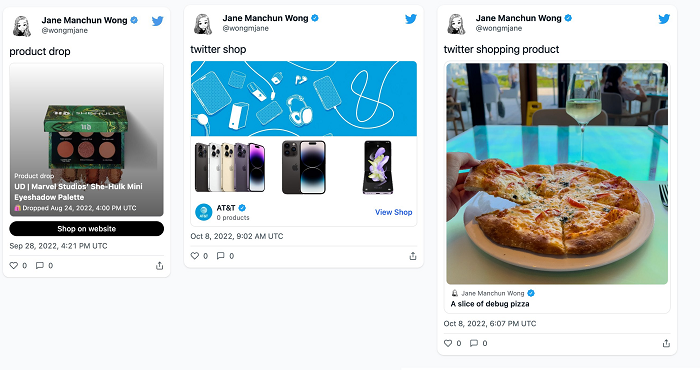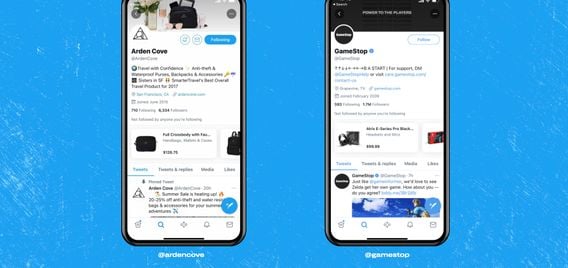While the jury’s still out as to whether western social media users actually want to buy products in-stream, every platform is still testing out new shopping options and tools, in order to ensure that they don’t miss the social commerce boat, if it does end up gaining real momentum.
And while Instagram, TikTok and Pinterest are probably the most obvious social shopping destination apps, Twitter too is working on various new commerce integrations, including its Shop element on Professional Profiles, new product display ads, and more.
Twitter’s next big shopping development looks set to be new product cards within tweets, that will better enable brands to highlight new products, and re-direct Twitter users to their Shop and product display listings.

As you can see in these examples, shared by app researcher Jane Manchun Wong, Twitter’s working on a variety of different product cards that you’ll be able to attach to a tweet, which then refer users to either visit the direct product listing on your website, or to visit the Shop on your Twitter profile.
As noted, the Shop element is part of Twitter’s Professional Profile offering, which recently also got an analytics update to provide more functionality for brands.
The Shop module provides a showcase element for eCommerce brands, where you can present your offerings in a swipeable display for your profile visitors.

These new card options will better facilitate product promotion in the app, and in combination with its new ad tools for products, it could help to fuel more shopping discovery, and shift habitual behaviors in the app.
Though as noted, thus far, habitual behaviors around social shopping haven’t really shifted a heap.
Following the lead of Chinese social trends, where in-app shopping has become a key, emergent activity, western social platforms have been looking to implement more direct shopping experiences, including live-stream shopping, which is now a major direct buying option among Chinese users.
But western audiences just haven’t been as receptive. Meta recently scaled back its live-stream shopping push, while TikTok has also been forced to take a step back with its plans due, at least in part, to limited consumer interest.
It seems, at least right now, that western audiences are not as keen to integrate social and shopping experiences. But maybe that’s a developmental concern, and it’ll just take time to see any major shift. Maybe it’s a trust issue with social apps, and giving over more of your data, and in particular, payment info. Maybe it’s something else entirely.
The bottom line, however, is that right now, social shopping is not a major element for the Facebook’s and Twitter’s of the world. But it still might be, and if one platform can get it right, that could see social shopping click with a much broader audience, which could indeed see it become a bigger part of the Twitter experience.
Which is why it’s looking to keep in touch, and improve its direct purchase tools. It’s not the key focus right now, but it is worth noting Twitter’s developments here, and considering what they may mean for your future tweet strategies.



